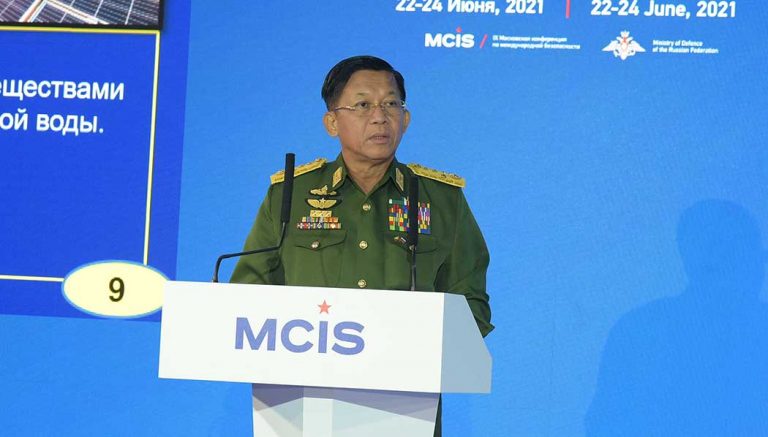June 24
The Senior General said that he would like to extend greetings to all attendees to the 9th Moscow Conference on International Security.
He said he would discuss the topic of the Asia-Pacific Region in the Context of Global Politics at the conference.
The Asia-Pacific Region is of great importance in the world according to the geopolitical conditions. Such a region occupies the one-third of the world economic market and it is a focal point of the main maritime routes. More than 100,000 vessels pass the Indian Ocean per year and over 70,000 vessels the Malacca Strait yearly, flowing commodities worth US$1 trillion per year. As such, it can be seen that the region is playing a key role in the transport and communications sector. About 80 per cent of the world’s oil production is being transported via the Indian Ocean while 40 per cent of the world trade passes the Malacca Strait.
Hence, the Asia-Pacific Region is much crucial in geopolitics and geo-economics, and it becomes the World’s Economic Centre of Gravity recognized as a strategic area in the New World Political Order.
Although the Asia-Pacific Region is a focal point for global development and opportunities, it much affects regional politics and security due to strategic competitiveness.
The security measures which are strategically changing in the Asia-Pacific Region are much related to the political situations of regional countries.
Every country faces impacts of COVID-19 on the economy and human health, cyber arena and danger on the improvement of modern technology. Regional groupings and the rising of competitiveness among these groups become both conventional and non-conventional security threats, and these measures are challenges for the development of the Asia-Pacific Region.
Effort for economic integration in strategic competitiveness among the world powerful countries is a point to shape the good future of the Asia-Pacific Region. Enhancement of economic cooperation in the Asia-Pacific Region can mitigate the diversity among the countries while revitalizing the globalization process as well as contributing much to the UN Sustainable Development Goal.
At present, countries across the world including ASEAN are encountering economic crises. As peoples from their respective countries are facing difficulties of basic needs, now is time to prioritize providing necessary assistance to attend to their basic needs.
It is necessary to prioritize more cultivation and production of primary staple foods such as rice and wheat for the people in the agriculture sector with the aim of ensuring food sufficiency of the people. Moreover, efforts should be made for extending the cultivation of other crops for humans on one hand. As such, relevant organizations and authorities need to manage to raise public awareness of the efficient use of water sources. Extreme consumption of freshwater causes terrible worries for the future world. Likewise, it should reduce the unlimited extraction of underground natural resources. It is necessary to use renewable energy such as hydropower, windmill electricity and solar power.
It is seen that regional grouping, military expansion, the strategic and economic competitiveness of powerful countries in addition to the competitive implementation of national interests and competitive armament would be fueling the conflicts in the Asia-Pacific Region.
Every independent country has sovereignty regardless of the small and the large as well as the powerful and the weaker. They all have an equal term of rights. All the countries throughout the world need to safeguard their sovereignty, and they all have the rights to safeguard it. But, it is necessary to avoid the acts of staging the threats with strength and encroaching on the sovereignty of other countries with the wrong concept over the rights. The countries need to frankly cooperate with other countries and regions.
China is implementing the Belt and Road Initiative with the enhancement of cooperation with countries from the Asia-Pacific Region.
The ASEAN region is located in the area linking the Indian Ocean and the Pacific Ocean and as a centre of the Indo-Pacific Region. Regional countries need to focus on peace, stability, security and prosperity. Moreover, those countries need to realize mutual respect over the sovereignty, mutual understanding and non-interference in the internal affairs of any country.
In striving for ensuring the peace and stability of the Asia-Pacific Region, equality and equal development, it is necessary to avoid the situations which may cause conflicts or confrontation and firmly enhance non-military cooperation including the issues on improvement for the process of trust-building, the prevention, containment and treatment of COVID-19 pandemic.
Some countries holding one-sided policies are applying various ways and means for dominating over the different political systems and attitudes. The attempts are seen to interfere in the internal affairs of sovereign countries showing reasons for democracy and human rights. The international community needs to cooperate with one another for ensuring the peace, stability and sustainable development of the world based on justice, equal valuation and fairly international laws.
Currently, Myanmar is striving for restoring political peace and stability. The current government is focusing on the reappearance of honesty over democracy.
Being a member of the ASEAN, the Senior General said that Myanmar is fully participating in the peace and stability of the region and development tasks in line with the attitude of the ASEAN. —MNA


